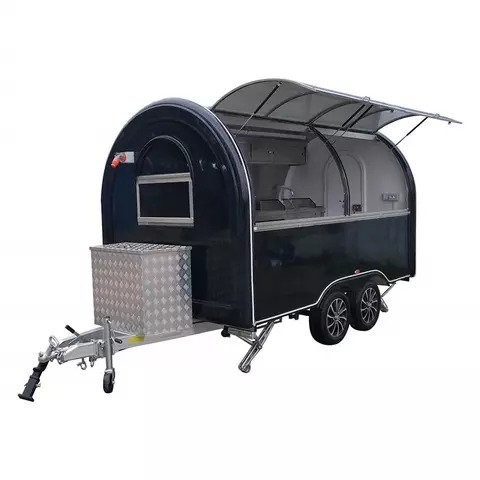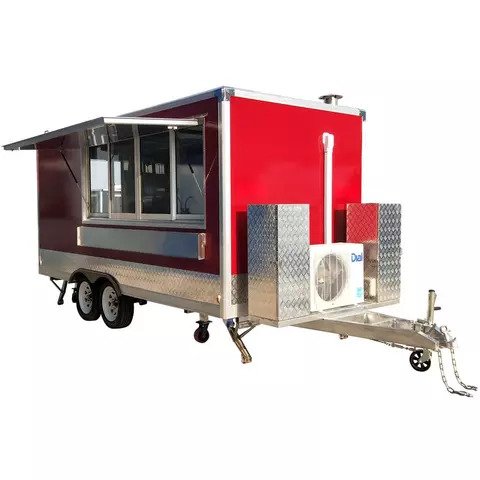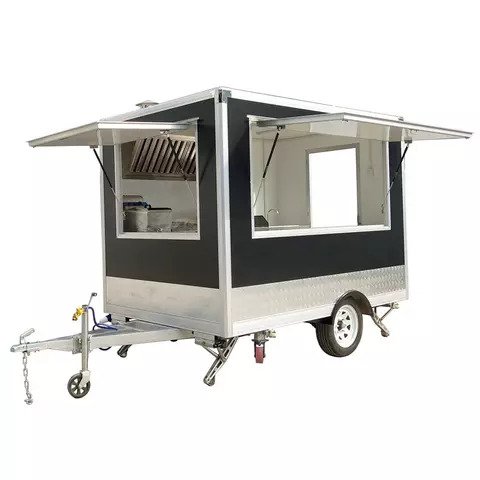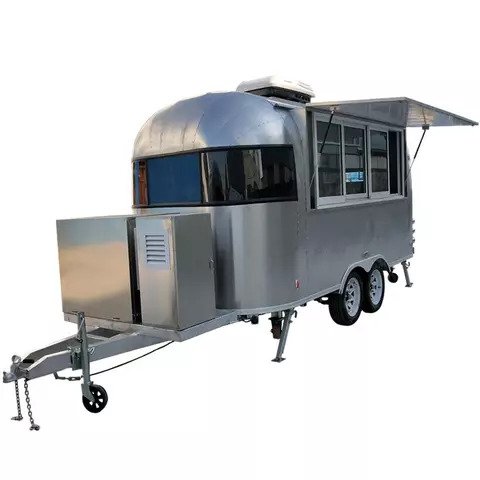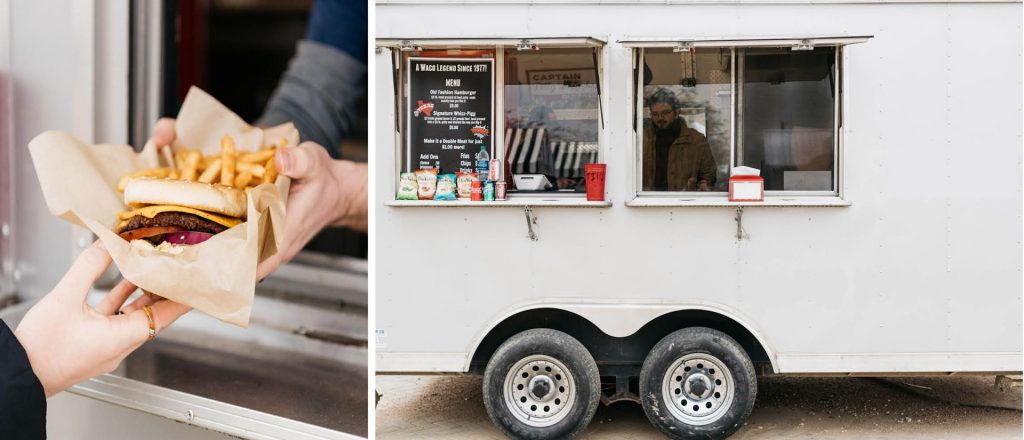
A mobile street food cart is a portable kitchen set up on the road to prepare and sell road food to passers-by. Food carts are usually found in cities worldwide selling food of every sort.
One allows the seller to sit or stand indoors and serve food through a window. In the other, the seller stands alongside the mobile food cart, while all of the space in the cart is used for storage and to house the cooking machines, usually a grilling surface. The cart design is determined principally by the sort of food.
Food cart is not the same as mobile food truck because they don’t travel under their own power. Some mobile food carts are towed by another vehicle, while others are pushed by a person or animal.
If you have always dreamed of diving head first into the exciting, occasionally profitable food business, but you are on a super-tight budget to get things rolling, you might have considered buying a used street cart or food kiosk to check proof-of-concept for your new idea. Unlike full-scale food trucks, which could easily cost upwards of $80,000, or maybe a concession trailer (which begins at approximately $20,000), a little, one-person operation like a food cart may be a perfect way to present your cooking or your notion into the world, particularly in case you intend to maintain your focus exceptionally narrow. Starting at only a few thousand dollars, a food cart offers ease of freedom, a small kitchen that is easy to keep clean, an the ability to start cooking immediately without worrying about hiring employees or buying tremendous amounts of inventory.
But how can you begin buying a street mobile food cart?
If you have started looking into the area of food carts and wagons, you will get a massive variance in the type and dimensions of the cart, in addition to the price. A conventional hot dog wagon is most likely the first thing that pops into mind when most folks begin dreaming of a mobile food cart, but these kinds of portable units can be adapted to function almost anything you can imagine, from pretzels into tamales to shaved ice to corn on the cob. Finding just the right design to fit your needs and your concept is the first place to begin, and we have prepared this handy-dandy guide that will help you work out the appropriate questions to ask, what to search for, and the red flags to avoid.
Things to consider when purchasing a food cart.
Ready? Let’s begin.
Figure out what sort of food cart you’ll need, and find the one which most closely matches those requirements. This might seem like an obvious first step, but it is an important one. Start by contacting your local health department, to make sure that the sort of food you intend to produce can be lawfully sold from a cart or kiosk.
You will want to get a used food cart that most closely matches the items you’re interested in selling. By way of instance, if you intend to sell burritos, it is a lot easier to attempt to find a cart that’s served burritos, rather than trying to accommodate the very limited equipment on a hot dog wagon to fit your requirements. Similarly, a kiosk that specialized in serving shaved Hawaiian ice, might not have some of the principles you need in place to initiate a chili wagon. Refine your idea down to one or two key signature products, determine what you’ll have to serve those things, then buy a used cart which mostly closely matches your concept, and you will save yourself a huge amount of time and frustration in the long term.
Have a look at included equipment, and find out if there is room to expand. Based on how much care and attention the former owner gave your food cart, there may be a lot that should be addressed or repaired before you can begin slinging food. Where possible, ask to inspect the food cart when it’s operational, which means that you can evaluate things such as the food heating system, any problems with the electric system (where applicable), or where there are possible health code violations lurking just under the surface.
Carefully evaluate any present equipment, and verify it is all in working condition. Also examine the total level of cleanliness of the food cart or kiosk; this is a fast way to get a general sense of how much care and attention was given to the food cart by its previous owner, since somebody that can not be bothered to wash a grease trap, probably also is not being meticulous about checking to ensure wheel bearings are well lubricated.
Be sure the lineup of gear that is included, matches your own concept. And when your food cart or kiosk does not have the gear you will want off-the-shelf, is there room to make adjustments or expand?
This may feel a little silly, but going through the motions of support is a fantastic method to identify issues on your workflow. Ideally, you should be able to generate the whole order in just a couple quick motions. Where will the order go when it is finished? Will it be given to the client? Where is the client going to be standing during all this? What if there is a line? Where will THOSE clients be standing? Will all of these people today interfere with service at all?
Ask the vendor to talk you through any possible known problems. Obviously, there is a bit of a”trust” part in drama, but it is worth asking. Most private party sellers will be upfront about giving a list of known issues or idiosyncrasies using their gear; effective food cart or kiosk owners typically do not mind discussing these issues, and might even see them as a badge of honour. Understand that each and every piece of cooking equipment has some known problems, including a refrigerator door that does not seal totally correctly, or a enormous dent in which an overzealous dog assaulted the corner of the cart. Learn about all these issues beforehand, and work out how hard they are to fix or if they will affect your ability to conduct business. Ask the seller once the food cart or kiosk was last certified to be used, and accredited by the health inspector.
There’s a whole lot of cash in food carts, and possibly even more in their structure. Check to be certain all equipment is securely bolted down or suitably contained, and there are no leaks anywhere. Start looking for surfaces which are made from stainless steel, to make it effortless to clean. Inspect axles and wheels to be certain they’re turning freely.
Check for rust, especially on the bottom of the cart. The aluminum body which makes up the majority of your food cart will not rust, but the steel framework which makes up its construction can be exposed to rust and the elements. Rust is insidious, and when there’s rust within the day you purchase the food cart, it almost certainly will have to be eventually repaired before it causes serious damage to construction.
Assess laws in your town, and just buy what you require. Because different food carts or kiosks are equipped so differently, depending on how they have been formerly used, you might realize that your prospective purchase is outfitted with equipment you do not need. Check local laws about the equipment required for managing a food cart on your area; for instance, many countries require a food cart to have the identical 3-bay and hand wash sinks as you would find on a bigger concession trailer or mobile food truck. You will want to know what is required on your condition, before you start.
However the food cart you purchase is equipped, you will likely need at least two items: Water and propane.
Propane System:
Are your key cooking appliances or warmers powered by propane? Are you going to have to get propane delivered, or is there a detachable tank? Is the tank big enough to power multiple appliances for many days at a time? Is there a spare, as required by some countries? Are all gas connections to appliances tight, with regulators set up as needed?
Water Method:
Does the food cart have a water source for a handwash sink? How large is it? Is it producing water that’s at least 110 degrees, as evidenced from the health department? Is your water brown or muddy, signaling rust in the tank? In the event you needed to replace the hot water heater, is it simple to reach and accessible? The way the wastewater tank is drained? Is there a three-bay sink for washing dishes, using another hand wash sink?
Finally, evaluate if or not a food cart or kiosk is what you are after. Rememberyour concept may not let you serve your food from a cart or kiosk on your state. If you’re arranging a mobile company with food which require extensive preparation or cooking, a full size food truck or concession trailer may be the solution you’re looking for. Make decisions based not on what sounds the easiest or cheapest to begin, but on what the real needs of your company are, and act accordingly.
Customized Mobile Food Carts Unique For Your Company from Yeegoole Food Cart Manufacturer
For over 10 years Cart Concepts International are producing custom street mobile food carts which stand out and grab attention. Whether you’re planning to market coffee, fried products, hot dogs or any other treat our experienced staff can facilitate all your needs, making your vision a reality. Contact Yeegoole expert designers to get the ideal mobile street food cart solution for you.
Yeegoole specialized in creating premium quality street mobile food carts which are designed to last.
- Choose a size
- Choose your color
- Refrigerators and coolers
- Suitable for both cars and motorcycles
- Additional accessories
Yeegoole serve Personal Vendors, Colleges, Schools, Factories, Institutions and Much More. Whatever your needs, Yeegoole’ve got the experience you require.
Take your product to your client, whatever you sell, our habit food carts can cater to your needs:
- Barbeque
- Hot Dogs
- Cookies
- Fried Foods
- Kabobs
- Coffee
- Gyro’s
- Rotisserie Cooking
- And More …
Take a look at some of Yeegoole food cart samples:
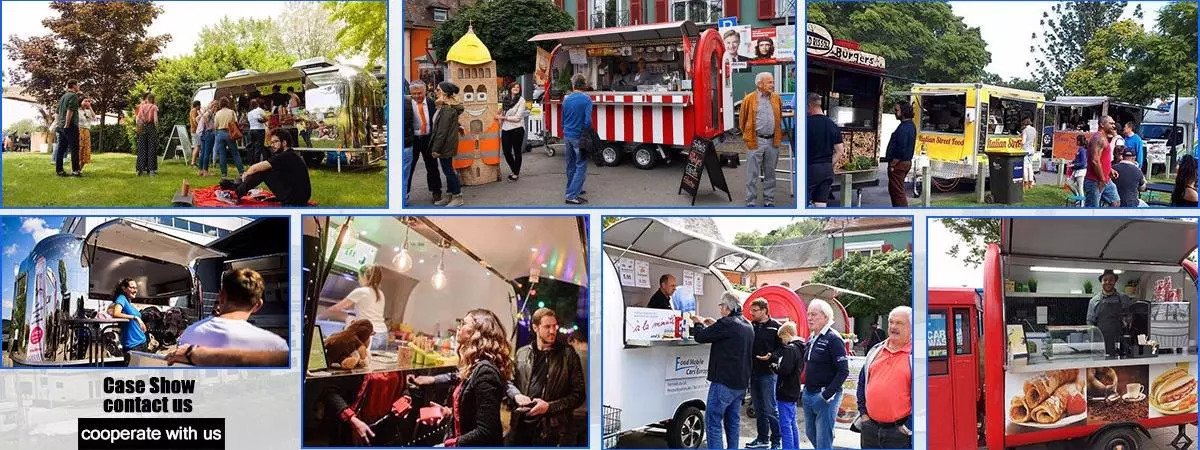
More food carts, food trucks, please visit food vehicle B2B trading platform >>
